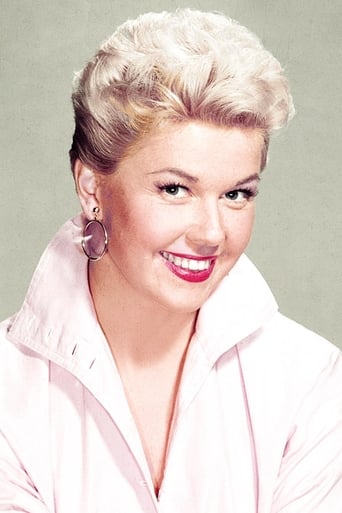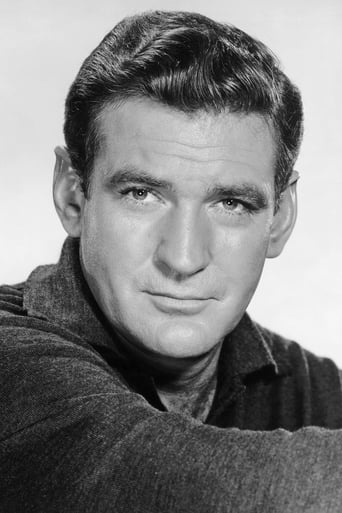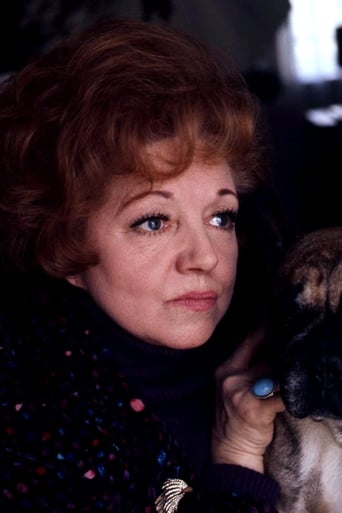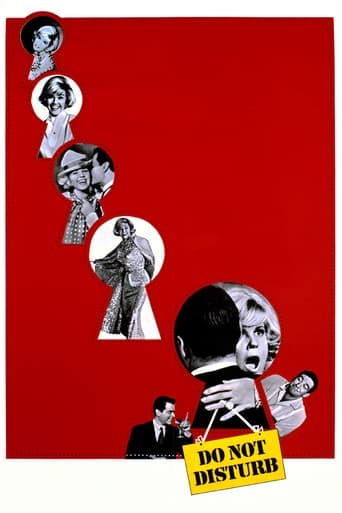
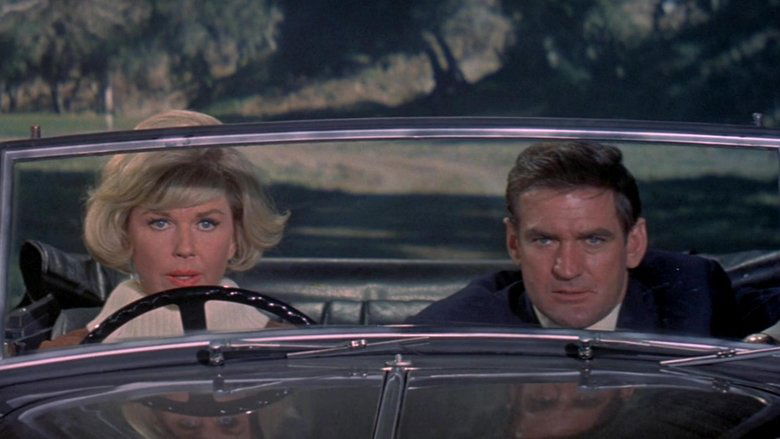
Do Not Disturb (1965)
American Mike Harper, sent to do business in England, moves there with his wife, Janet. But she soon becomes convinced that Mike is carrying on with his attractive new assistant, Claire. Mike also has been spending a considerable amount of time with his British bachelor buddies. Vexed and lonely, Claire hires charming antiques expert Paul to decorate the Harper home and maybe make Mike jealous in the process.
Watch Trailer
Cast
Reviews
Wow! Such a good movie.
everything you have heard about this movie is true.
Am i the only one who thinks........Average?
The storyline feels a little thin and moth-eaten in parts but this sequel is plenty of fun.
After his new job requires him to move to London, "Mike Harper" (Rod Taylor) and his wife "Janet" (Doris Day) end up in a large home out in the country. This causes some problems for Mike due to his heavy workload and as a result he also rents a small apartment in London. This causes even further problems when Janet begins to suspect that Mike is having an affair with his assistant, "Claire Hackett" (Maura McGiveney). To rectify this her landlady, "Vanessa Courtwright" (Hermione Baddeley) recommends that she engage in an affair of her own—or at least an imaginary affair in order to make Mike jealous. Although Janet refuses to do this things take on a life of their own when she decides to go to Paris with an interior decorator named "Paul" (Sergio Fantoni) to pick out some badly needed furniture. Now rather than reveal any more I will just say that I didn't think this was one of Doris Day's better comedies as it lagged for pretty much the first hour or so. Fortunately, it picked up after that and became somewhat interesting from there. Slightly below average.
American couple Mike (Rod Taylor) and Janet Harper (Doris Day) move to England for Mike's work, his company which deals in wool textiles and wool fashions. Despite Mike's want for them to live in a flat in the heart of London, Janet, who is not a big city girl, ignores his want and instead finds them a house to rent thirty miles outside of London in Kent, which means that Mike has to commute into town by train.Not much seems to be written about this film. Why not? It is a decent romantic comedy and has the fun theme of Americans in Europe, particularly London and Paris. Is there not someone who has analyzed the films of Doris Day? Though not the greatest movie and not one I am likely to watch again, it really does alright for what they were going for. I guess at some point the director was replaced and the film fell behind schedule, but this does not seem obvious to me.
One of the lesser of Doris Day's last dozen years of Hollywood film making: mostly non-musical romantic sitcoms, with various mostly high profile men. I mostly prefer her earlier musical romantic comedies, mostly costarring high profile male singers, such as Gordon McRae, Howard Keel, and Frank Sinatra, perhaps peaking with "Calamity Jane". Of her '60s films, I most enjoyed "Lover Come Back", with Rock Hudson, the musical romantic comedy ""Billie Rose's Jumbo", with help from veterans Jimmy Durante and Martha Raye, and 'The Ballad of Jose", which as I see it, is basically a non-musical, historically relevant remake of "Calamity Jane", which ends with the same basic take home message about the independent woman trying to make it in a traditional male role, which by then was no longer politically correct.In this film, she plays the dumb blond kept trophy wife of a wealthy American wool textiles company executive(Rod Taylor, as Mike Harper), who has been assigned to move to England and figure out why their European market has been doing so poorly , and figure out how to fix it. Thus, Doris is playing the ideal stay-at-home '50s wife she became at the end in "Calamity Jane" and "The Ballad of Josie". The problem is that this is the mid-60s world of women's lib political change. Doris has become bored with her very limited scope life and lack of children, and feels her husband has been neglecting her and possible fatherhood in deference to promoting his career. She seems not too bright in adjusting to her new situation, having much trouble figuring out the UK money system of the time, and proving worthless in finding the way to the commuter train station, to get her husband to work. She spends her time figuring out ways to spend her husband's money in often needless home improvement and decoration projects for their new rented mansion, in taking in some rather unusual house pets(red fox, goat, and chickens), and ultimately being convinced by her busybody landlady, Vanessa, that her husband is having an affair with his new secretary: Claire Hackett, hence justifying her countering with an affair of her own. Her tongue lashing of the fox hunters and their hounds is hilarious. Vanessa arranges for romantic gifts to arrive for Doris, who confesses to her husband what is going on. Vanessa also recommends to Doris a Paul Bellari as a good dealer in exquisite home furnishings. Paul, a married man with several kids, flies Doris to his shop in Paris. He takes her to lunch in a fun café, and she gets drunk on too much champagne. Can't fly home because of a heavy fog, so they return to his shop, get locked in from the metal store front shutter, she passes out from more champagne, and her husband arrives in the morning to punch Paul and leave.Her husband is also in Paris for a wool textiles exposition. No wives allowed is the rule of dominant textiles buyer Langsdorf. So, Doris decides to pose as her husband's assistant: Miss Hackett. In her stunning yellow-orange sparking gown, she is the hit of the evening party, which includes many young female escorts. She dances with Langsdorf and other textiles buyers. Langsdorf wants her for his personal assistant and bed partner for the night, but she politely declines. She makes up with her husband over the Bellari affair, then dumps a fruit salad on him when Miss Hackett unexpectedly shows up, presumably as his escort. A little later, she overhears Miss Hackett talking to a handsome French buyer, saying that she wants to become his assistant, as Doris's husband doesn't seem much interested in her. Thus, Doris wants to make up with her husband again, but Miss Hackett gives her Langsdorf's room number instead. She puts on her minimal nightie and gets into bed with a sleeping man, only to realize later it's Langsdorf. He chases her all over his large room, until his wife shows up(?). Doris runs into an adjacent room and hides under s sheet on the bed. Her husband arrives and they bounce around on the bed, which collapses. The take home message is that husbands should not neglect romancing their wives sufficiently, in deference to their career ambitions and other interests, especially if their wife doesn't have sufficient other sources of meaningful activities and ego gratification.This film rests entirely on Doris's intrinsic likability. After the first segment, most of the humor relates to several suspected cases of infidelity, Doris's doings while drunk, and her impersonation of Miss Hackett: none of which are terribly side-spitting, aside from the flying olive down the back of her dress caper, and the terminal bedroom mix-up farce. Aura McGiveney, as Miss Hackett, is hardly credible competition with Doris for her husband's romantic attention. We don't find out whether her husband achieved his goal of increasing European textile sales, nor whether he learned his lesson long term relating to Doris. Doris as a kept woman, and she and her husband being uptight about little infidelities, was out of sync with the then women's lib and youth counterculture movements. As a young woman, Hollywood actress Hedy Lamar was actually in the situation of being a kept trophy wife, by a much older rich European. She rebelled against her cloistered life and escaped to the US.
Doris Day is a ray of sunshine in most of her films, and Do Not Disturb is no exception. She is perfectly cast as the neglected wife, isolated and bored in Kent, England. Day's character (Janet Harper)has a husband who is not playing his part in the marriage, and takes her for granted. What she needs is an interest which takes her outside of the marriage and the idea of the good, dutiful wife.Day's comic timing is so masterful that it reinvigorates the otherwise tired clichéd, and stereotyped gags. Ironically Day deconstructs our stereotypical perspective of Hollywood glamour by not taking herself too seriously and as such taking a swipe at the movie star image. Very clever and well accomplished albeit in an inadvertent way.If you are a fan of Day, then this film is a must see, but it's also great if you just want a carefree chuckle.
